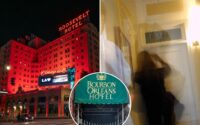Southall is a new luxe farm resort just outside Nashville
Southall, a new luxury farm resort just outside Nashville, Tenn., is as all-American as a Norman Rockwell painting.
Opened in December, the property is a true working farm, with expansive apple orchards, formal kitchen gardens, acres of land for foraging wild edibles, and 15,000 square feet of hydroponic and traditional conservatory greenhouses to keep the harvests going all year round.
All that land allows guests to meander along 5 miles of hiking trails through old-growth forest, kayak and paddle board across the 7-acre Lake Mishkin and pull up chairs by the outdoor fire pits.
Unlike a Norman Rockwell painting, Southall packs in luxury perks like a 15,000-square-foot spa with eight individual treatment rooms and two couples suites, as well as an all-season heated pool overlooking the lake.


All-day dining at Sojourner offers southern favorites on a menu which evolves daily depending on what’s fresh, and this spring will bring the debut of a signature dinner restaurant called January.
A certified canning kitchen — dubbed the Jammery (how Rockwellian is that?) — serves as a demo space for culinary education, pickling and canning workshops, and tastings of the resort’s local honey.
“Our honey tastings have been extremely popular,” said executive chef Andrew Klamar. Southall’s honey has been recognized as one of the best in the country, winning Good Food Awards in 2020 and 2022, before the resort even opened to guests. “One of the jokes we tell during the honey tastings is that we hope when our guests go home, they take their squeeze bear of honey out of their cabinets and throw it out. Ours is that good.”

While Nashville has seen a hurricane of hotel development in recent years, it oddly lacked a true resort property.
Southall, however, opened just 30 minutes outside the heart of Music City in the satellite suburb of Franklin — a longtime refuge for country music stars. The location made sense. Franklin has become the American South’s place to be, with an estimated population just shy of 90,000 — up sevenfold from a mere 12,407 in 1980.
“No one has ever built an amenity like this here before,” said founder Paul Mishkin, who worked in Chicago’s securities and options trading industry for 40 years before coming to Tennessee in 2013 with the idea of developing a farming-focused real estate investment. He fell in love, as many have, with the region’s temperate climate, rolling hillsides and unpretentious air.

“I had never seen anything like this area,” said Mishkin. “And the land was inexpensive relative to what I thought the value could be.”
He bought the first parcel of what would eventually become Southall a year later in 2014, and slowly started accreting nearby parcels into a 325-acre property — the only problem was that the land had virtually no infrastructure.
“I learned that it is basically impossible to take raw land with no utilities, a 1-inch water pipe and some electrical from the city,” said Mishkin. “I took this raw land and like ‘Sims City,’ turned it into something. It was a massive undertaking with zoning and bringing in the resources.”

Southall was created over more than seven years of development. The costs and challenges of building a working agriculture-focused hotel from scratch were significant, but it’s a concept that’s already been proven.
Blackberry Farm, a Relais & Chateaux property located 200 miles east in Walland, Tenn., has capitalized on (and, some would say, pioneered) the luxury farm model since first opening in 1990.
The two properties differ in key ways: Blackberry Farm is 50 minutes by car from the smaller city of Knoxville, and Southall is just outside downtown Nashville; Blackberry Farm commands 4,200 acres as opposed to Southall’s 325; and Blackberry Farm’s all-inclusive rates easily soar over $2,000 per night with a three-night minimum, whereas rooms at Southall start at $839 per night.
“Franklin has exploded with growth and has become very attractive,” said Mishkin. “There’s a lot less open country than when I first came here, but I like to think we’re preserving what we can. The land I have is at least 90% green still.”


